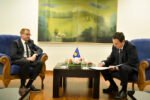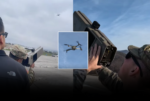The European Union remains a strong supporter of North Macedonia’s European integration journey, affirmed EU’s top diplomat Kaja Kallas during her official visit to Skopje on May 23.
Kallas reiterated that North Macedonia must fulfill its commitments and ensure the successful implementation of Plan A agreed with the EU. Otherwise, she noted, “we will have to move to another plan.”
“The road to membership is not easy, but stay the course. Take steps toward opening the chapters, and we, as the EU, will further support North Macedonia. Progress can come swiftly if there’s political will. We believe that integrating the Western Balkans into the EU is the best recipe for regional peace,”
Kallas stated during a joint press conference with Prime Minister Hristijan Mickoski.
She praised the country’s reform efforts and called it a “trusted partner in regional security,” particularly for aligning its security policies and legislation with those of the EU.
Prime Minister Mickoski emphasized that EU integration must be based on European values, not bilateral disputes. He urged EU member states to show greater understanding of his country’s situation.
“We belong to the EU, because we’ve built a democratic society for decades. We’re investing, sacrificing, and hoping our efforts will be recognized. We are ready — the EU can count on us — but now it’s time we can also count on the EU,”
he declared, calling for clearer signals and renewed trust from Brussels.
Kallas said she and Mickoski discussed mechanisms to resolve tensions with Bulgaria, but did not disclose specifics.
“It’s clear we want North Macedonia to move forward. We are aware of the obstacles, and we’ve explored ways to overcome them — but I won’t go into detail for now,”
she added.
Mickoski announced that a potential high-level meeting between the EU, U.S., Bulgaria, and North Macedonia might occur on the sidelines of the next NATO summit, aiming to address the current deadlock.
Relations between Skopje and Sofia deteriorated following Bulgaria’s veto on the EU accession talks, citing disputes over language, history, and alleged discrimination against its citizens in North Macedonia.
Bulgaria lifted the veto in 2022, after North Macedonia accepted the French proposal, which includes amending the Constitution to recognize the Bulgarian minority.
In alignment with Kallas’s remarks, European Council President António Costa recently emphasized that enlargement is a shared strategic goal and the best geopolitical investment for peace.
“What was agreed in 2022 must be delivered,”
Costa stated, referring to constitutional changes required for EU accession progress.
During her visit, Kallas also launched the EU–North Macedonia Security and Defense Dialogue, alongside Foreign and Trade Minister Timčo Mucunski and Defense Minister Vlado Misajlovski. The dialogue stems from a security partnership signed in November 2024.
According to North Macedonia’s Foreign Ministry, the dialogue marks a crucial step in deepening cooperation in foreign policy and security, and in the country’s further integration into the European security architecture.
Kallas and Misajlovski also visited the Balkan Medical Task Force (BMTF) headquarters at the “Ilinden” barracks, where they met with personnel and viewed equipment procured with support from the EU Peace Facility.
Since 2023, the European Council has approved three bilateral support packages worth €38 million to strengthen the military capacity of North Macedonia — including logistics, intelligence, surveillance, electronic warfare, and medical equipment.
Before arriving in Skopje, Kallas visited Belgrade and Pristina, marking her second Western Balkans tour since taking office — following visits to Montenegro, Albania, and Bosnia and Herzegovina earlier in April.







